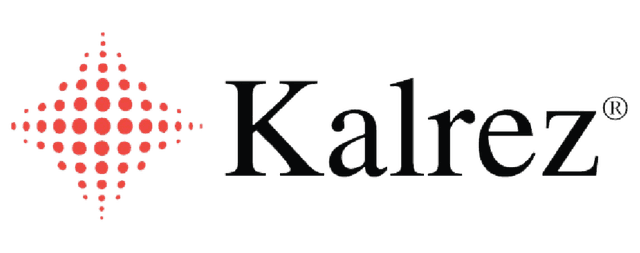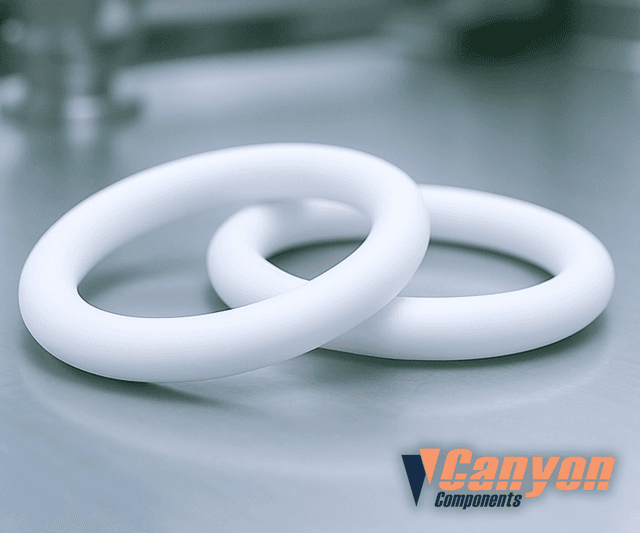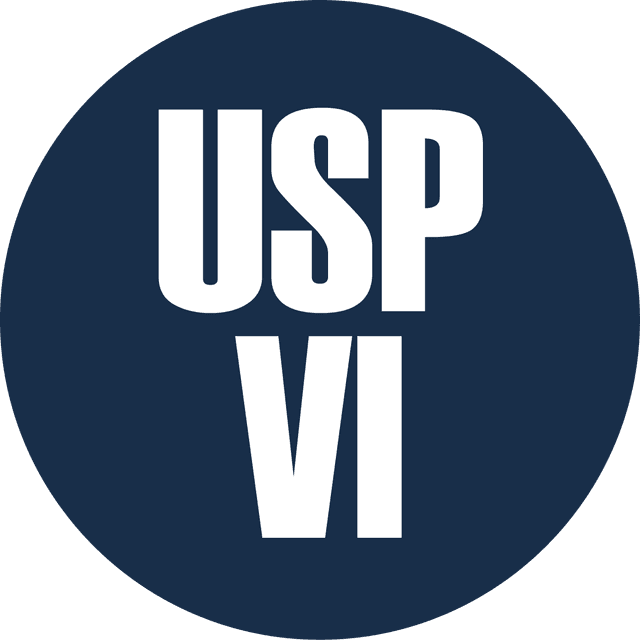
FDA Compliant Materials
FDA compliant materials are essential in industries where materials come into contact with food, beverages, pharmaceuticals, and medical devices. These materials must meet strict standards set by the U.S. Food and Drug Administration (FDA) to ensure they are safe for use in food processing, drug manufacturing, and medical applications. This guide covers FDA CFR 21.177.2600 grades A through F, the key features of FDA compliant materials, common applications, and the pros and cons of using these materials in critical industries.
FDA compliant CanRez® FFKM and Kalrez® O-rings, gasket rapid manufacturing, & custom molded parts are available now!
Check with one of Canyon’s helpful product engineers for an expert material and manufacturing recommendation.

FDA CFR 21.177.2600 Grades A Through F
FDA CFR 21.177.2600 provides specific guidelines for rubber articles intended for repeated use in food contact applications. The regulation defines grades A through F, each tailored to meet specific performance and safety criteria:
- Type A-D elastomers are used in the production of articles intended for repeated use in contact with dry food.
- Type A-E elastomers are intended for use in articles that come into contact with aqueous foods.
- Type A-F elastomers are used in articles that come into contact with fatty foods. It's important to select the appropriate type of elastomer for the specific food-contact application to ensure compliance with FDA regulations and prevent contamination.
Each grade ensures that the rubber material used in food processing and handling equipment remains safe, does not leach harmful substances, and maintains its integrity over time.
Features of FDA Compliant Materials
FDA compliant materials offer several key features that make them suitable for use in food, pharmaceutical, and medical applications:
- Non-Toxic: These materials are rigorously tested to ensure that they do not leach harmful chemicals or substances into food, beverages, or drugs during use.
- Chemical Resistance: FDA compliant materials offer excellent resistance to oils, fats, acids, and chemicals commonly encountered in food processing, pharmaceutical manufacturing, and medical devices.
- Temperature Tolerance: Many FDA compliant materials can withstand extreme temperatures, making them suitable for applications ranging from food cooking to pharmaceutical sterilization processes.
- Durability: These materials are designed to resist wear, abrasion, and degradation, ensuring long-lasting performance in repeated-use applications.
- Hygienic Properties: FDA compliant materials are non-porous and easy to clean, preventing contamination and bacterial growth, which is critical in food and medical environments.
Please consult a Canyon Components Engineer about your specific application and we will use our decades of experience to formulate a solution that fits your need.
FDA Compliant Materials Available
This table shows many of our standard materials and links out to our O-ring store. Get in touch with us if you need a custom gasket, custom molded part, or non-standard geometry!
Filter by
Temperature Search (°C)
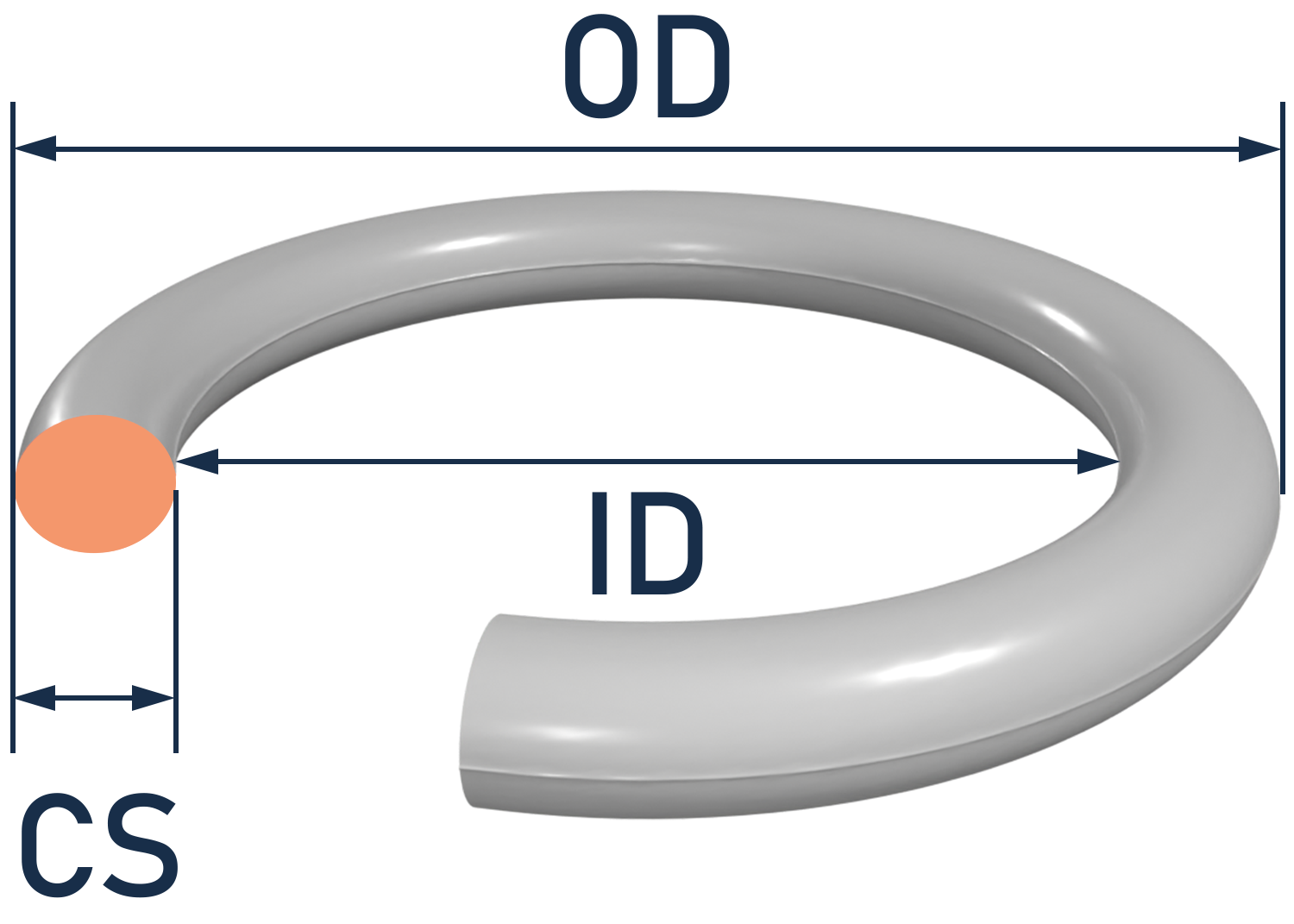
Get a Quote Now!

Common Applications of FDA Compliant Materials
FDA compliant materials are used in a variety of industries where safety, hygiene, and reliability are critical:
- Food and Beverage Processing: FDA compliant materials are used for seals, gaskets, hoses, and tubing in food processing equipment, ensuring that no harmful substances contaminate food or beverages during production.
- Pharmaceutical Manufacturing: In pharmaceutical applications, FDA compliant materials are used for seals, gaskets, and tubing in drug manufacturing equipment, ensuring the purity and safety of pharmaceutical products.
- Medical Devices: FDA compliant rubbers and plastics are used in medical devices such as seals, gaskets, and tubing for drug delivery systems, infusion pumps, and surgical equipment.
- Dairy Processing: FDA compliant seals and gaskets are essential in dairy processing equipment to prevent contamination and ensure product purity during milk, cheese, and yogurt production.
- Packaging: FDA compliant materials are used in food and pharmaceutical packaging to prevent contamination and ensure that the packaging materials are safe for direct contact with products.
FDA Compliant Elastomers
FDA Compliant Materials
Discover FDA compliant materials, designed for use in food processing, medical devices, and pharmaceutical applications. Learn about their safety features, regulatory compliance, and how they meet stringent industry standards.
Specialty Compliances
Canyon have materials available for O-rings, gaskets, & custom parts with compliances ranging from USP Class VI <87> & <88> for medical applications, to FDA CFR 21.177.2600 grades A through F for different food types, to the various drinking water specifications like KTW and NSF. Whether it's metal, rubber, or plastic, Canyon can meet your needs!
Custom Parts
Here at Canyon Components, we make sure to offer our customers any manufacturing technique they desire. Whether your FDA compliant O-rings, gaskets, & custom molded parts be rubber, plastic, or metal, rest assured that Canyon Components can make it!
CanRez™ FFKM Perfluoroelastomer
Extreme temperatures & chemicals require extreme solutions! FDA compliant CanRez™ FFKM materials offer extreme reliability where you need it most! Thousands of sizes in stock now!
Kalrez® FFKM Perfluoroelastomer
Canyon Components offers FDA compliant Kalrez® Perfluoroelastomer (FFKM) O-rings, gaskets, & custom molded parts at competitive prices and with great lead-times.
FDA compliant Parker® O-rings, Parofluor parts, parker FKM Viton
Canyon Components offers FDA compliant Parker Hannifin® O-rings, Gaskets, FDA compliant Perfluoroelastomer (FFKM) parts, & custom molded parts at competitive prices and with great lead-times.
FKM (Viton®, Fluorocarbon)
FDA compliant FKM compounds, O-rings, gaskets, & custom molded parts exhibit excellent mechanical attributes as well as excellent resistance to high temperatures, mineral oil, ozone, fuels, hydraulic fluids, and many other solvents and chemicals.
Fluorosilicone (FVMQ)
The mechanical and physical properties of FDA compliant Fluorosilicone O-rings, gaskets, & custom molded parts are very similar to silicone. Fluorosilicone O-rings, gaskets, & custom molded parts offer improved flexibility and strength, better resistance to fuels and mineral oil, but reduced hot air resistance.
Silicone (VMQ, PVMQ)
FDA compliant Silicone seals, O-rings, gaskets, & custom molded parts are excellent for extreme temperatures in static applications. Canyon Components carries a range of silicone materials, and we are happy to custom tailor a seal to meet your application requirements!
EPDM (Ethylene Propylene)
FDA compliant EPDM materials, O-rings, gaskets, & custom molded parts can operate over a wide temperature range, and are compatible with glycol fluids that cause problems for most typical elastomeric seals.
NBR (Nitrile, Buna-N)
FDA compliant Nitrile O-rings, gaskets, & custom molded parts are very oil-resistant, have strong mechanical properties, are resistant to wear, and are relatively inexpensive. These properties make Nitrile the most commonly used general purpose O-ring, gasket, & custom molded part material.
PTFE Encapsulated
FDA compliant FEP and PFA encapsulated O-rings consist of an elastomeric core and a seamlessly closed casing of modified PTFE. The elastomer core of encapsulated O-rings is typically made of FKM (Viton) or VMQ (silicone) and guarantees a uniform pre-tensioning at the sealing point.
PTFE (Teflon)
The harshest environments require specialized solutions. Often times, a Canyon Components FDA compliant PTFE O-rings are used in harsh chemical environments. Polytetrafluoroethylene, commonly known as PTFE or Teflon®, is a high-performance fluoropolymer known for its exceptional chemical resistance, low friction, and non-stick properties.
FDA Compliant Plastics
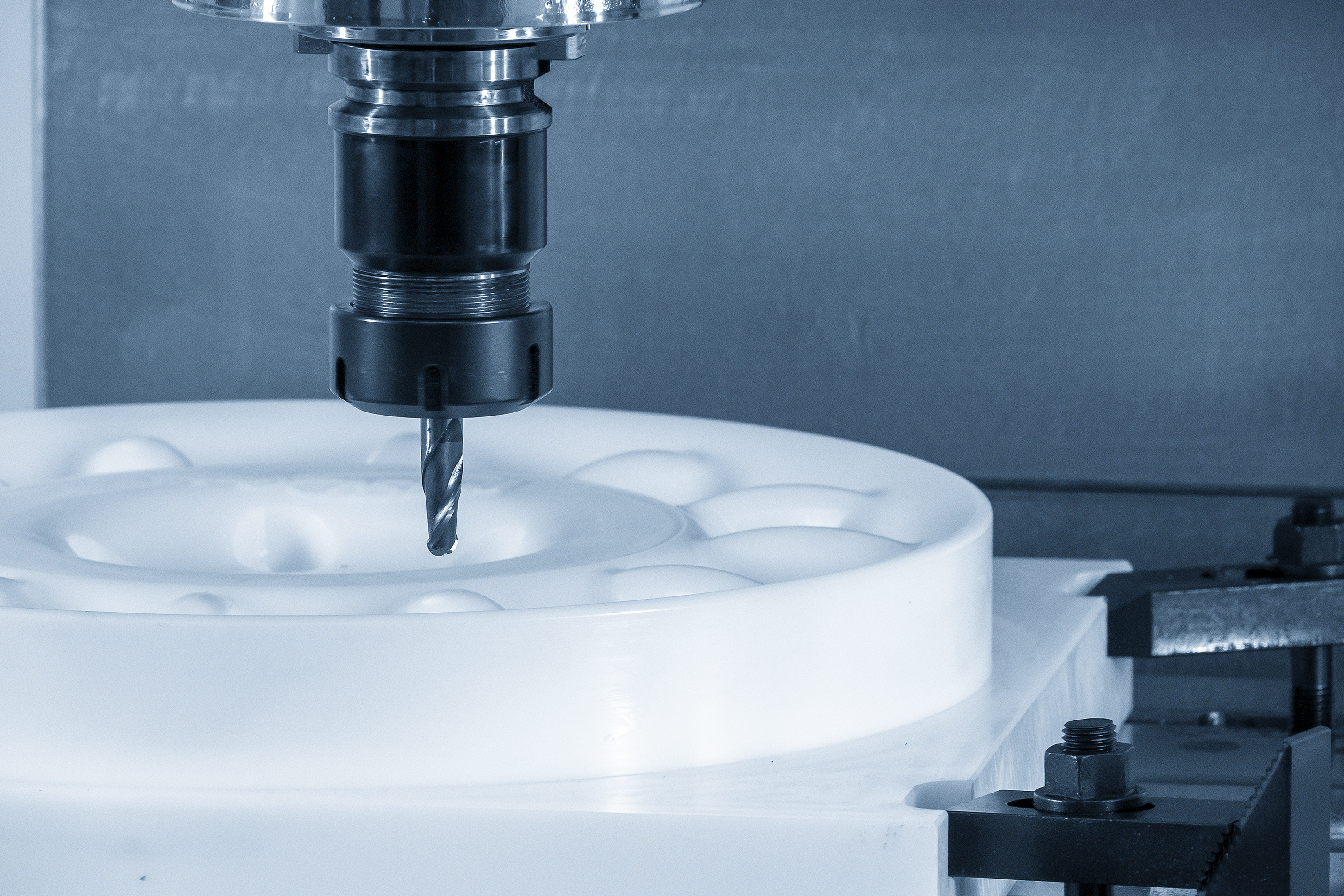
X-Ray and Metal Detectable Materials
In addition to their FDA compliance, many materials are also available in x-ray and metal detectable versions. These additives enhance the safety and quality control processes in food and pharmaceutical production environments:
- X-Ray Detectable Materials: These materials contain additives that make them visible during x-ray inspections, allowing food and pharmaceutical manufacturers to detect any foreign material contamination in the final products.
- Metal Detectable Materials: Metal detectable FDA compliant materials contain metal particles that can be identified by metal detection systems commonly used in food processing facilities. This provides an additional layer of safety, ensuring that any contaminants introduced during production are quickly detected and removed.
- Improved Quality Control: The inclusion of x-ray and metal detectable properties in FDA compliant materials enhances the safety and quality assurance processes, helping to reduce the risk of product recalls and ensuring compliance with regulatory standards.
FDA Compliant Materials Pros & Cons
FDA compliant materials play a critical role in ensuring the safety, reliability, and hygiene of products used in the food, pharmaceutical, and medical industries. With features such as non-toxicity, chemical resistance, and durability, these materials meet the stringent requirements outlined in FDA CFR 21.177.2600 for food contact and medical applications. While the cost and material limitations may present some challenges, the benefits of using FDA compliant materials far outweigh these considerations for applications where safety and regulatory compliance are essential. Understanding the features, applications, and pros and cons of FDA compliant materials will help you make informed decisions to ensure the quality and safety of your products.
Canyon Components strives to meet all customer service requests. Feel free to contact Canyon Components engineering and let our knowledgeable staff help you design the perfect part for your needs.
Pros of FDA Compliant Materials
FDA compliant materials offer several advantages that make them a preferred choice for critical applications in food, pharmaceutical, and medical industries:
- Safety Assurance: These materials meet stringent FDA standards, ensuring that they are safe for use in applications where they come into direct contact with food, beverages, and pharmaceuticals.
- Versatility: With a wide range of grades available, FDA compliant materials can be tailored to meet specific application requirements, whether they involve exposure to oils, fats, acids, or water.
- Durability and Performance: FDA compliant materials are designed to withstand harsh conditions, including extreme temperatures and exposure to chemicals, ensuring long-lasting performance in repeated-use applications.
- Compliance with Regulations: By using FDA compliant materials, manufacturers can ensure their products meet regulatory requirements, minimizing the risk of non-compliance and recalls.
- Hygienic Properties: The non-porous nature of these materials prevents contamination and bacterial growth, making them ideal for use in sanitary applications.
Cons of FDA Compliant Materials
While FDA compliant materials offer numerous benefits, there are also some potential drawbacks to consider:
- Higher Cost: FDA compliant materials often come at a higher cost compared to non-compliant alternatives due to the extensive testing and certification required for FDA approval.
- Limited Material Selection: Not all rubber or plastic materials are FDA compliant, which may limit material choices for certain applications.
- Processing Complexity: Manufacturing FDA compliant materials may require specialized processes and equipment to ensure compliance with FDA standards, which can increase production costs.
Relevant Compliances
USP Class VI Materials: Certified for Medical and Pharmaceutical Applications
Explore USP Class VI materials, certified for use in medical devices, pharmaceuticals, and food processing. Learn about their features, compliance standards, and how they ensure safety and purity in critical environments.
NSF 51 Materials: Certified Components for Food Equipment Applications
Discover NSF 51 materials, designed for use in food equipment and food contact surfaces. Learn about their safety, compliance with regulatory standards, and how they ensure hygiene and durability in food-related applications.
Materials for Food and Dairy
Explore FDA Compliant and 3A Materials: specially designed for food and dairy industry, ensuring hygiene, safety, and compliance with strict standards.
Back to Compliance Hub
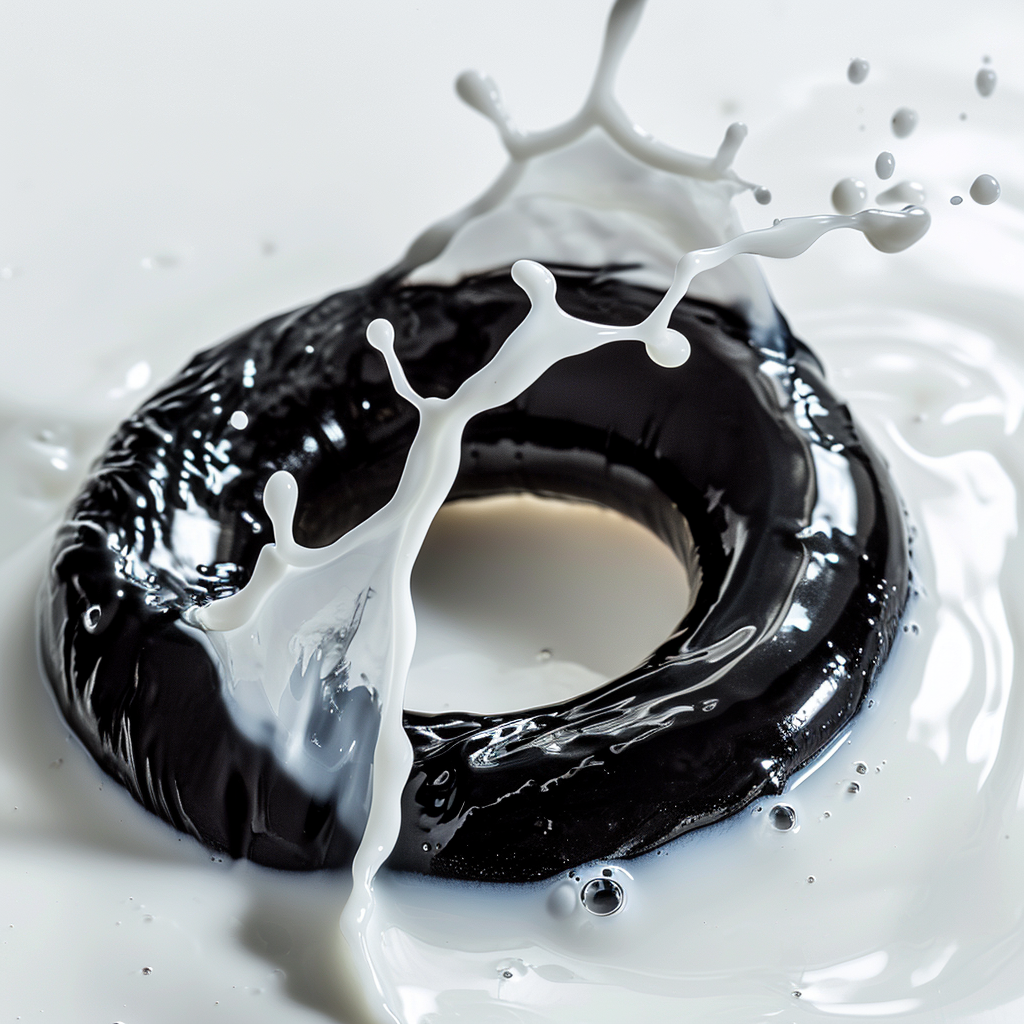
Get A Quote Now!






